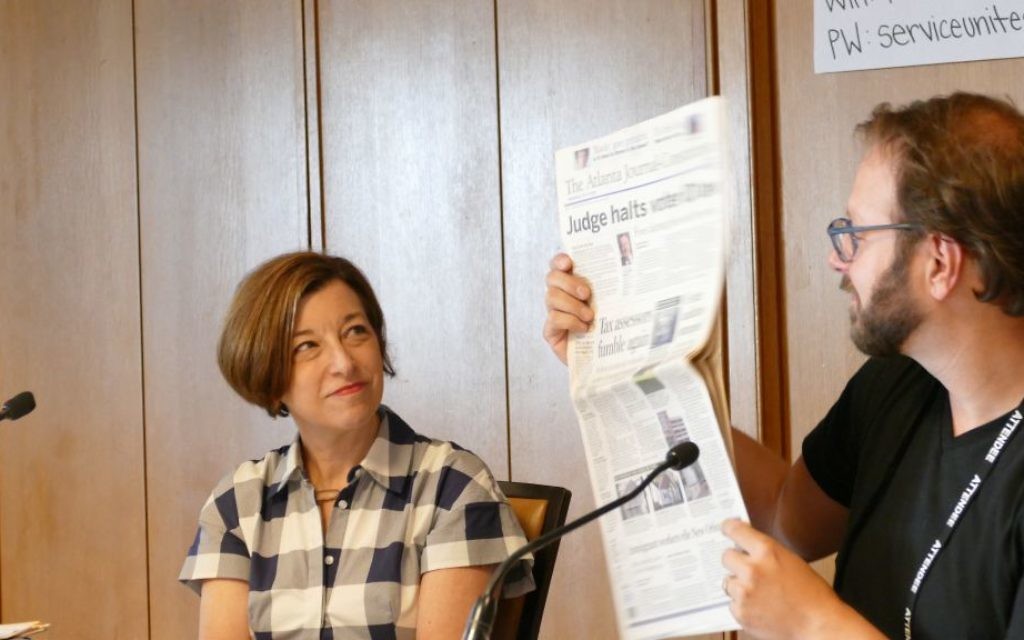Atlanta Opens Arms to Repairing Our World
Repair the World looks forward to partnering with local organizations after it opens a location in Atlanta.

Jewish values, a strong identity and affinity toward service are traits Repair the World aims to promote among Jews. The nonprofit hopes to expand that viewpoint this summer by launching its eighth community in Atlanta.
Aside from Atlanta’s rich civil rights history, vibrant Jewish community and strong culture of service and civil engagement, the nonprofit selected Atlanta because of the city’s overlapping narrative between civil rights and Jewish engagement.
Two of those narratives were highlighted during Repair the World sixth conference which gathered 50 delegates to learn more about social change and Judaism on Monday, June 18 at the Omni Atlanta hotel.
Get The AJT Newsletter by email and never miss our top stories Free Sign Up
Fifth generation Atlanta native Elise Eplan grew up learning about social justice through her parents who were very involved in the civil rights movement. It was that background that prompted her to create volunteer opportunities that were not only flexible but also substantive and fun.
After speaking with a friend who started New York Cares, Eplan was determined to create her own organization. Eplan quickly learned that the best lesson was to not reinvent the wheel or to bring in friends, but promote diversity.
After careful planning, Eplan appointed 12 founders who were disproportionately Jewish to launch Hands on Atlanta in 1989, which continues to offer multi-generational and cultural volunteer opportunities. The group’s founders are diverse in terms of race, religion and gender, which was not something obvious 30 years ago, Eplan said.
With the help of philanthropic executive Michelle Nunn, Eplan and her team were able to grow Hands on Atlanta which she believes ties to Jewish engagement. She said, “We still tend to draw a disproportionate number of young Jews because, as everyone knows, it’s a part of who we are, and a lot of young people, Jews and non-Jews want to do something meaningful, which is the case for Hands on Atlanta.”
She added, “It’s a startup story, but my Jewishness and my involvement in BBYO is what gave me the gumption to start something. It’s about helping people repair the world and I am happy to be one of those people.”
This also was the first time Repair the World welcomed all its board of directors at its annual conference. Before Seth Cohen became the senior director for the Charles and Lynn Schusterman Family Foundation, he served as a corporate attorney and is known for his role as the leading attorney in a federal civil rights law suit protecting Georgia citizen’s voting rights.
In many ways the trial was the beginning of more tests to come, Cohen said. But his first trial began 20 years before he moved from New York to Atlanta and he had a difficult time meeting people. “I’d like to say that I was this proud, deeply social justice Jew, but the truth is I was a really nice Jewish-engaged young adult. I had been to summer camp and was involved in a Jewish fraternity … But when I moved to Atlanta I didn’t know anybody.”
Cohen eventually got involved in Jewish Family & Career Services, and through its volunteer program, he was able to make friends and help homeless people, an innate interest for him. Via Project Connect Cohen was able to engage into other services, such as refugee assistance, which 20 years ago were unorganized.

That was one important step, Cohen said, which led to his greater involvement in the community. “It was the day I expressed interest in intersecting my Jewish identity with something universal such as caring for people who did not have a home.” he said. From that moment, Cohen became more involved not just in Jewish services but in homeless service and was asked to serve on the JF&CS board.
“I was more engaged because I had that Jewish connection and particularly because of the J in JF&CS, which really enforced the values we have as a Jewish community, plugged into the universal community we were supporting,” Cohen said.
Before Cohen knew it, he got involved in other organizations such as the Jewish Federation of Greater Atlanta and the Anti-Defamation League’s Glass Leadership Institute, which allowed him to connect his profession as a lawyer with social justice and Jewish identity.
“All of a sudden I was able to see what civil rights means and how it all intersects with the way we engage and support individuals who are homeless.”
On October 18, 2005, Cohen and organizations such as the Anti-Defamation League, American Civil Liberties Union, and National Council of Jewish Women, as well as Miles Alexander, former attorney for Martin Luther King Jr., were instrumental in stopping the law for voter IDs.
“To me,” said Cohen, “that moment of empowerment was really the sum of everything I learned. From being a volunteer who happened to be Jewish, from being a lawyer who understood what justice meant and from being a justice seeker who knew how to use his skills as a lawyer.”
Federation CEO Eric Robbins said, “Atlanta is the type of place where people make things happen. It has been growing in leaps and bounds for many decades … This is a city where you can dream something and make it happen and it’s a city of justice and doing the right thing.”
He added, “bringing Repair the World to Atlanta has really ignited a tremendous amount of energy and I think that is because people live in a very assimilated city, but they also are holding on to something that is very important to them, which is their Jewish identity.”




comments